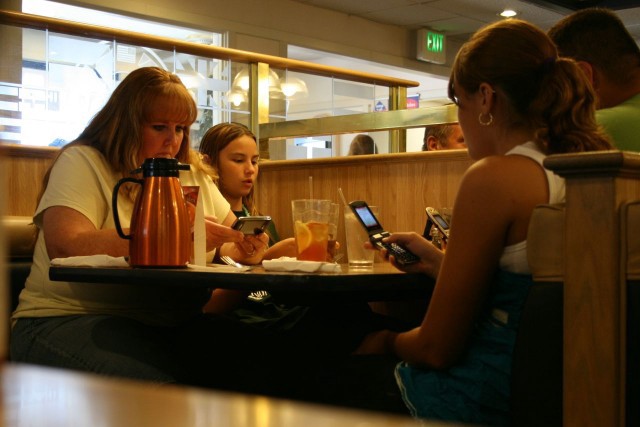One Is the Loneliest Number, So Find a Cell Phone Family Plan
by Liz Rowan

About a week after I graduated from college, I broke the news to my father: I was leaving the family plan. He had been paying my cell phone bill for the previous five years, after giving me my first phone at 17. Before cell phones were standard for teenagers, my father would make me empty my pockets before I went out with friends to show him I had a few quarters for a pay phone — just in case. But as soon as my first boyfriend started hanging around our house, he handed down his old phone without me even asking. Daddy’s little girl was expected to check in on the regular.
When I moved out of my rowdy college house and into a sensible apartment with one sensible roommate, I thought it was time to cut the cord. I was paying my rent, car insurance, and electric bill by myself. I had a retirement account. I totally had adulthood under control. The last piece of the grownup puzzle was my phone bill.
My father didn’t put up much of a fight, but I’m starting to realize that we shared a phone plan in a different time. When I graduated from college, I had a pink Motorola Razr and we didn’t need a data plan. Every now and then, he had to remind me not to go over my text message limit.
My phone bill is my tiny declaration of independence. Well-meaning boyfriends have generously offered to put me on their parents’ family plans. I’ll never know how those boyfriends’ parents would react to this kind of assumed generosity, because I always balked right away. What if we broke up? What if I became a CIA spy and had to disappear on a mission? No scenario was too outlandish to consider, but the point was this: If I ever needed out of that relationship, I needed to be able to pick up my phone and go. I didn’t want to have to send checks to anyone’s parents every month.
But the extended-family plan is here to stay. A 2013 survey found that more than two in five parents pay for their adult children’s cell phone service. It’s not just new grads that are piggybacking: This is two to five parents of adults aged 18 to 35. Thirty-five! That’s more than halfway to retirement!
I was incredulous. Where was the A+ adulting I was expecting from my peers? I started to ask my friends what was up with family plans. Overwhelming result: they were all still on it, and they were shameless. It’s a whole lot of: ¯_(ツ)_/¯
One college roommate admitted that she wondered about getting her own plan: “I asked once because it felt like the grown-up thing to do, but my mom said it would be way too expensive.”
“To pay what I get on my parents’ plan on my own would easily be $40 more expensive,” another college classmate said.
Parents aren’t just being generous — they’re getting the benefits too. “We share a plan with my parents,” said a married woman with two kids. “We pay our share and they pay theirs. It was cheaper than us both getting service for two people each.”
The family plan rides on, out of sight, out of mind.
I watched my 30-something fiancé finagle his own family plan recently: two parents, two children over the age of 25. I thought they were an anomaly — the idyllic midwestern family that loves one another enough to share data. But it turns out that old habits die hard, and discounts sometimes last forever. I thought that being on a family plan would be a pain to manage when anyone wanted a new phone, but my fiancé was paying less than half of what I was paying for comparable service.
I’m getting married in the fall, and the offer/threat/promise is there: Do I want to get on the family plan? Sure I do, but I’d feel better about it if the plan was going to be just for my husband and myself — not a party of five. But my contract isn’t up until December, so I’ve been stalling with “I’ll think about it.” Out of sight, out of mind.
Lisa Rowan lives in Washington, D.C. She is a writer and a vintage shop owner. You can rip her Philadelphia phone number from her cold, dead hands.
Photo: Artotem
Support The Billfold
The Billfold continues to exist thanks to support from our readers. Help us continue to do our work by making a monthly pledge on Patreon or a one-time-only contribution through PayPal.
Comments